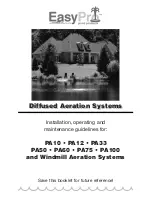
12
C-9000
Series
Reassembly
Use all pages of the assembly drawing
during the reassembly process to assure
correct orientation of the parts
Note: If the pump will not turn freely after a
component is installed, then the pump needs
to be inspected further to determine where
the unwanted contact is occurring.
Caution:
Please review the precautions
listed on Page 7 for Magnetically
Coupled Pumps.
Provide a can of compatible lubricant,
preferably a mineral oil or process-
acceptable synthetic lubricant such as
glycerin. If none of these materials are
available it is acceptable to use rubbing
alcohol as a substitute lubricant. Shaft,
arbor, dowels, and gears should be
lubricated prior to assembly. Take care
to remove excess fluid from between
the plate surfaces using a clean, lint-free
towel. Threads on bolts should be
lubricated with an anti-seize compound
or a molydisulfide based grease See
Figure 11
. During assembly, considerable
care should be taken to prevent wedging
or jamming of close-fitting components.
Never force the parts together. They
will drop or press into place with finger
pressure if properly aligned.
1.
Insert the o-rings (34) into the grooves
on the front and rear plates (8,7).
Replace these o-rings if they have
been damaged.
2.
Place the front plate (8) in a
vise that
has soft protective jaws.
Grip the pump
on the port sides of the front plate with
the inner surface of the plate facing up.
3.
Push both slip-fit dowels (10) into the
dowel holes in the gear plate (3).
4.
Place the gear plate (3) on the front
plate (8) and align the dowels so they
slip into the corresponding holes on
the front plate. Make sure that the bolt
holes also line up when fitting the gear
plate on the front plate. See
Figure 12.
5.
Place the round key (4) on the arbor
(9) and fit the driven gear (5) on to the
arbor.
Note:
The driven and driving
gears are identical in most models.
6.
Snap the retaining rings (16) onto
the arbor and slip the arbor into the
front plate (8).
7.
Install the round key (4) into the
keyway on the drive shaft.
8.
Slide the driving gear (5) onto the
drive shaft and against the retaining
ring. Take care to align the keyway in
the gear with the key (4). The key may
need to be held down to prevent it
from being damaged by the gear
9.
Insert the drive shaft (2) into the front
plate (8) and insert the gear into the
gear pocket of the gear plate (3). See
Figure 13.
10.
Install the rear plate (7).
Figure 11
Figure 11
Figure 13
Figure 13
Figure 12


































